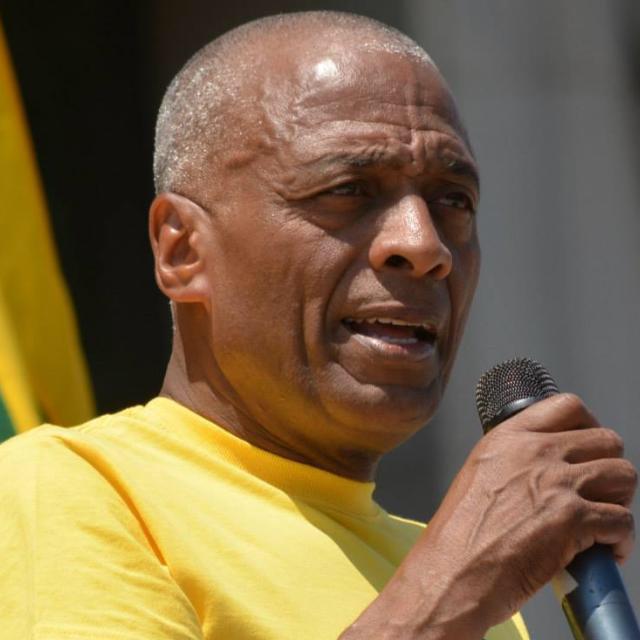Hamm Running for U.S. Senate

As U.S. Senator Bob Menendez flails amid a corruption scandal, People's Organization for Progress Chairman Larry Hamm today announced his candidacy for the U.S. Senate.
He's already filed the paperwork.
A longtime, legendary political activist, this is going to be Hamm's second statewide run.
In 2020, Hamm challenged incumbent U.S. Senator Cory Booker (D-NJ) and received 119,000 votes in the Democratic Primary.
Hamm's the second major candidate to jump in the contest against Menendez, following U.S. Rep. Andy Kim's announcement yesterday.
His direct challenge of Booker carried multiple layers of dramatic resonance, overlapping storylines and even inevitability. Both born in Washington, D.C., they came to New Jersey as babies, 16 years apart, Booker the son of IBM executives to Harrington Park; and Hamm the son of a truck driving father and seamstress mother to the Central Ward of Newark. They both attended ivy league colleges, Booker Yale and Hamm Princeton, and both saw Newark as the proving ground. But while Booker spent a brief time as a tent-pitching protester before winning his first city council seat in 1998 and thereafter leaping upward from one elected office to the next (councilman, mayor, senator, and now, he hopes, president); Hamm lost his 1974 citywide shot and then, in the early 1980’s, founded the social and economic justice-agitating grassroots outfit, the People’s Organization for Progress (POP).
ORIGINS
For Hamm it started back in the spring of 1967 when he threw rocks at his elementary school as repayment for the school ejecting his friend.
The school’s principal responded by ejecting him.
His mother had cried when Hamm’s father died when the boy was four years old.
But with little Larry seemingly headed for oblivion on the streets of Newark, his mother broke apart in the principal’s office and begged for her son to be readmitted.
“Your son,” the principal told her, “is a common hoodlum.”
Still, they let him back in.
A mother’s tears hit harder than rocks.
Between his elementary and high school careers, in the summer of 1967, long-boiling tensions in Newark spilled with the July 12th police arrest and beating of cab driver John Smith at the 17th Avenue Precinct and subsequent rebellion by blacks against the city’s white establishment.
“It happened about a mile away from my house as the crow flies,” said Hamm. “All the ingredients were there for an explosion. Someone told me Springfield Avenue was on fire.”
He stood on the front porch of the building where he lived and looked across the street at the violent spectacle of people in the sweltering summer heat tearing garage doors off the front of a dry goods warehouse.
He looked up at his grandfather, Claude Cobb, a boiler man and WWI veteran, and wanted to know why everybody was so upset.
Why were blacks overrunning the streets?
“My grandfather didn’t start the discussion with Newark,” said Hamm. “He started the discussion with his service in the military when he was in the army and they went to France, and the French people were asking to see their tails. I was like, ‘tails??!!’ That was the first real discussion I ever heard about race – the night of the rebellion.”
Hamm had gone down south before the riot, and was with his mother and aunt on the train out of D.C. when the conductor made them move to the back of the train. But he had been so young at the time all he really remembered about the incident was the commotion caused by his hellraising Aunt Gladys as she resisted but finally relented and went to the back of the segregated train.
Now his grandfather was trying to illustrate how race affected people on a personal level.
“He was talking about his life,” Hamm said. “He hated the south. He was from the south. He told my mother he did not want to be buried down south.”
Was his grandfather expressing affirmation of the necessity of black resistance?
“I don’t know,” Hamm said. “The discussion was not that deep. My grandfather was not that militant. He was a hardworking man, who worked his whole life, got sick and didn’t go to work for two weeks and then he died. He’s buried in Glendale Cemetery in Belleville in the veteran’s section five rows from my father, who was a WWII veteran.”
But on that night and in the aftermath of the initial eruption, Newark was the warzone.
The regional news networks carried coverage of the “riots”.
“I saw contingents of national guard marching and rolling in, halftracks jeeps and trucks."






Mr. Larry Hamm is deserving because of his resilience and his integrity of his work. I am definitely voting for him.
Lift Every voice and Sing.
I have seen Mr. Larry Hamm's work first hand in the fight against injustices not only in Newark but throughout New Jersey. I will certainly cast my vote for this hard-working, dedicated leader who continues to fight tirelessly for all.